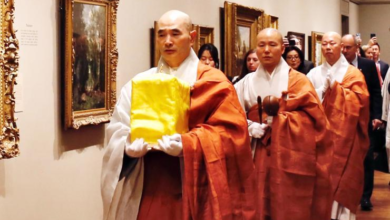https://www.koreatimes.co.kr/www/art/2024/04/398_372784.html

“Parasyte: The Grey” is a science fiction drama that explores environmental crises. Courtesy of Netflix
The K-content market is currently experiencing a surge of interest in science fiction dramas.
This month, streaming platforms are unveiling high-profile SF titles, including “Parasyte: The Grey” and “Blood Free,” along with Netflix’s “Goodbye Earth,” which depicts a society plunged into chaos for 200 days following a predicted collision between Earth and an asteroid.
Together with “Chicken Nugget,” released in March, the lineup of SF dramas for the first half of the year has more than doubled compared to the same period in 2022.
An overseas viewer of the Netflix drama “Parasyte: The Grey” called it “an impressive science fiction show. The transformation from human to monster and back is terrifying.”
According to the movie and drama rating site IMDB, “The Grey” has earned an average score of 7.3 out of 10, with 5,900 participants weighing in.
Since its release on April 5, it has maintained the top spot in Netflix’s series category worldwide for ten consecutive days, as tracked by FlixPatrol. The drama depicts a clash between humans and alien parasitic creatures that use humans as hosts.
In a striking scene from the Disney+ drama “Blood Free,” a holographic image of cattle strung up on the ceiling of a hotel hall is displayed as Han Hyo-joo’s character, Yoon Ja-yoo, CEO of a biotech company, unveils a cultured meat project to her guests.
The scene intricately shows the production process, where stem-cell-derived bright red meat is precisely layered with white fat, resembling the lines on a human’s palm. “Blood Free” is set in a speculative future where traditional livestock like cows and pigs are replaced by artificially cultured meat. It follows the investigation into mysterious deaths and uncovering the truth behind them.

“Blood Free” is set in a speculative future where food is replaced by artificially cultured meat developed from stem cells. Captured from Disney+
Shifting consumer preferences
Historically, South Korea has been a challenging market for SF dramas. In 2021, JTBC invested 20 billion won to mark its 10th anniversary with the ambitious “Sisyphus: The Myth,” which failed to resonate with viewers.
Even Kim Eun-sook, a writer known for hit shows, could not revive the struggling SF genre with “The King: Eternal Monarch” in 2020. Given this frosty reception, the current surge in SF drama production is unprecedented.
The shift is intertwined with changes in consumer behavior. Young adults, particularly those aged between 10 and 30, are already living lives that mirror SF narratives.
After experiencing social isolation during the COVID-19 pandemic, many now interact with AI chatbots as if they were human friends, and teenagers, increasingly aware of the climate crisis, are actively involved in environmental movements.
This familiarity with SF thinking and lifestyle has created a fertile ground for the consumption of SF dramas. Park Saeng-gang, a novelist and drama critic, said, “The rise of star writers like Kim Cho-yeop and Chung Bora and their approach to depicting the stifling realities of Korean life through SF have already made a significant impact in the publishing industry, and now we see this influence extending to drama production.”

“Goodbye Earth” is a drama that revolves around an impending collision between Earth and an asteroid. Courtesy of Netflix
Globalization fuels SF dramas
The globalization of K-content has played a catalytic role in the production boom of SF dramas. The four SF dramas released from January to April were all funded by global streaming platforms.
According to culture critic Jung Deok-hyun, “SF’s characteristic global narratives are appealing to international audiences through Korean dramas, which not only underscores the global impact of K-content but also reflects a strategic move to attract global subscribers with uniquely Korean SF stories.”
This shift in production capital from traditional strongholds like the United States and Britain to Korea is significant, as evidenced by Korean actor Lee Jung-jae wielding a lightsaber in the upcoming “Star Wars” series “The Acolyte.”
As the production of SF dramas increases, actors and crew members are facing new challenges. Jeon So-nee, who portrays a hybrid of human and parasitic lifeform in “The Grey,” shared her difficulties, “When I went to action school, even the trainers were unsure of what to teach for such a role. We ended up just focusing on basic physical training.”
The continued production of SF dramas is also seen as a reaction to acute social issues like a low birthrate and generational conflicts, which have heightened a sense of crisis about coexistence.
“Envisioning extraterrestrial threats to solidify internal cohesion is a classic trope and social function of science fiction. Challenges such as low birthrates add a layer of realism to the imaginative possibilities of the SF genre in Korea,” said Yun Seok-jin, a professor of Korean literature at Chungnam National University.

Han Hyo-joo plays the CEO of a biotech company in the drama “Blood Free.” Captured from Disney+
Half growth reliant on Japanese originals
In contrast to the original Japanese series featuring an ordinary high school student as the protagonist, “Parasyte: The Grey” features Jeong Su-in (played by Jeon So-nee), a woman and a crime victim who works at a supermarket and experiences a near-death revival.
This mirrors contemporary issues in Korean society, including hate crimes, such as an incident where a woman convenience store worker was assaulted by a stranger simply because she had short hair.
Director Yeon Sang-ho of “Parasyte: The Grey” said, “I incorporated elements that allow us to contemplate what coexistence truly means, assuming that the events dealt with in the original Japanese version happened simultaneously in Korea.”
While the production of SF dramas is on the rise, reliance on Japanese originals for series like “The Grey” and “Goodbye Earth” highlights the ongoing challenges in diversifying SF content in the Korean market. As the industry looks outward to international markets, the drive to innovate within the SF genre is stronger than ever, providing both opportunities and challenges for creators.
This article from the Hankook Ilbo, sister publication of The Korea Times, was translated by generative AI and edited by staff of The Korea Times.
Read the full article here








